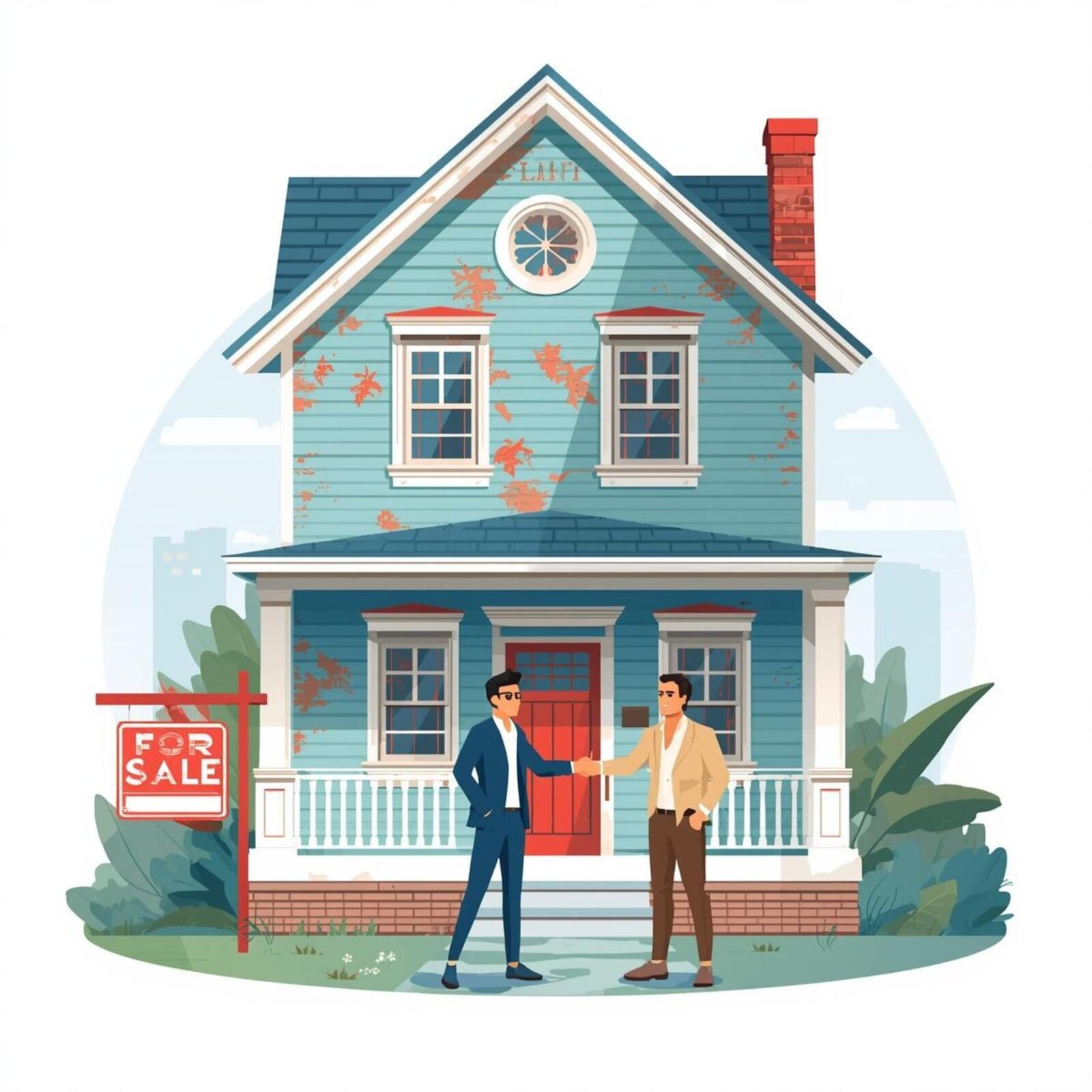It can be hard to sell an old house. Older homes often need repairs, have features that are out of date, and face tough competition from newer homes. But here's the good news: If you have the right plan, you can still sell your old house quickly and often for a good price.
This guide will answer some of the most common questions homeowners have about selling their older homes:
How to quickly sell an old house
Is it harder to sell older homes?
When is it not worth it to fix a house?
Do old homes have any value?
When do houses start to lose value?
What hurts the value of a house when you sell it?
Let's take it all apart.

How to Quickly Sell an Old House
Your house may not shine as brightly as a brand-new one if it's 20, 30, or even 70 years old. But speed is important, especially if you're moving, downsizing, or trying to avoid high repair costs. Here are some useful tips for selling an old house quickly:
1. Sell it as-is to someone who can pay cash.
The fastest way is to sell to a cash home buyer or investment company directly. These buyers buy homes "as-is," which means you don't have to fix anything, make any improvements, or even clean them well. You don't have to pay agent fees, wait for financing approval, or go to showings. XLNC Exotic Homes is the place to go if you live in California and want to sell your home quickly. We specialize in cash offers that are quick and easy.
2. Pay attention to first impressions
If you want to go the traditional route, make sure your house looks good from the street. Cut back bushes that are too big, paint the front door again, and clean up the yard. Before they even step inside, first impressions affect buyers.
3. Make small changes that make a big difference
You don't have to fix up the whole house. You can make a room feel new again without spending a lot of money by making small changes like changing old light fixtures, adding modern cabinet handles, or painting it a neutral color.
4. Set the Price Wisely
Overpricing is one of the main reasons why old houses stay on the market. Buyers look at your older home and compare it to newer ones. A price that is competitive can get people interested and lead to multiple offers. You can get a rough idea of what your home is worth by using tools like Zillow's Home Value Estimator.
5. Show off the charm
Many people like old houses because they have character, like hardwood floors, wide porches, and unusual floor plans. To attract the right people, highlight those features in your listing photos and description.
Are houses that are older harder to sell?
Yes, but not all the time.
It may take longer to sell an older home because buyers are worried about problems that aren't obvious, like the roof, foundation, or plumbing.
Compared to modern buildings, older designs may not look as good.
Sometimes, appraisals are lower because of the condition.
But just because a house is old doesn't mean it's hard to sell.
If they are well-kept, historic neighborhoods and homes with original charm often sell quickly. The key is to find the right kind of buyer, like an investor, a cash buyer, or a family that
wants character over newness.
When does it not make sense to fix a house?
The big question for every homeowner is, "Should I fix it or sell it as is?"
If a house is in bad shape, it might not be worth fixing.
- The cost of repairs is more than what the house is worth after repairs (ARV). If repairs cost $100,000 but the house would only sell for $120,000 after they were done, it doesn't make
sense to fix it. You can figure it out with the help of Investopedia's guide to After Repair Value (ARV).There are big problems with the structure. It can be very expensive to fix problems with the roof, foundation, or walls that hold up the load.
The location doesn't allow for higher prices. Even after renovations, a house in a neighborhood that is getting worse may not be worth much.
In these situations, it's usually better to sell to a cash buyer or investor.
Do old houses have any value?
Yes, for sure. There is hidden value in many older homes:
Value of the land: The land the house is on can be very valuable, even if the house itself is old, especially in cities.
Unique architecture: People who want character often buy mid-century modern, Victorian, or Craftsman homes.
Rental or investment potential: Investors see old houses as a chance to fix them up and sell them or rent them out.
The structure may be old, but the property is often worth a lot in the right market.
When do homes start to lose value?
There isn't a set number of years when houses start to lose value, but here's a general rule:
0 to 15 years: Homes are usually worth the most when they are newer and don't need much maintenance.
15 to 30 years: Things start to break down, and roofs, HVAC systems, and appliances may need to be replaced.
30 years or more: Houses that haven't been updated often have outdated designs and aren't very energy-efficient. The value may go down compared to newer homes.
50 years or more: Homes may need major structural repairs, but if they're in a good area or have historical value, they can still go up in value.
Check out the IRS's rules on the lifespan of residential property for more information on property depreciation.
What hurts the value of a house the most?
Some things can scare buyers away or lower their offers when you sell an old house:
Deferred maintenance—Leaky roofs, old plumbing, or broken foundations can lower the value of your home by thousands of dollars.
Old-fashioned interiors like popcorn ceilings, shag carpet, or old wallpaper can make buyers lose interest right away.
Bad location: Even the best house has trouble in a bad area.
Unpermitted work: Adding things to your home without the right permits can cause problems with the law and when you try to sell it.
Too much personalization—Homes with very bright paint colors or very unique layouts may turn off buyers.
Not caring about curb appeal: A run-down outside can turn off potential buyers before they even step inside.
How to Get the Best Price on an Old House
Get a pre-inspection: If you know about problems ahead of time, you won't be surprised during negotiations.
Target investors: They are often willing to pay cash and close quickly.
Be open: Be honest about your problems. Honesty is important to buyers, and it lowers the chance that deals will fall through.
Plan your stage well: With the right lighting and staging, even older homes can look good.
Final Thoughts
It doesn't have to be hard to sell an old house. Older homes have their own set of problems, like needing repairs and design updates, but they also have their own set of benefits.
The important thing is to know your options: sell it as-is for a quick sale, make small changes to make it more appealing, or market the charm to buyers who like character. Your home
is still worth something, no matter how old it is. You can sell it quickly and move on without too much stress if you have the right plan. Want to sell quickly in California? XLNC Exotic
Homes helps homeowners close quickly, without having to make any repairs, pay any fees, or wait
Questions and answers about selling old houses
1. Is it possible to sell my old house without fixing it up?
Yes. You can sell to cash buyers or investors who buy properties in their current condition.
2. Do houses that are old take longer to sell?
Yes, but setting the right price, marketing smartly, and showing off the charm can all help speed things up.
3. What costs the most to fix in an old house?
The most expensive things to fix are usually the foundation, the roof, and the plumbing.
4. Do houses always lose value as they age?
Not always. Location, maintenance, and upgrades can help older homes hold or even increase in value.
5. Who pays the most for old houses?
Cash buyers, investors, or buyers looking for unique historic properties often pay the best prices.

